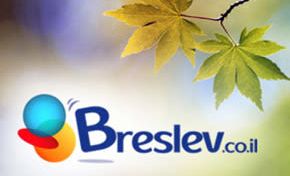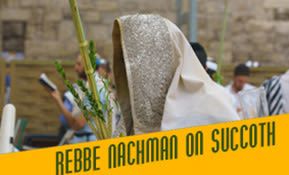
The Essence of Human Beings
Really, all the things we do are not our essential selves. They are merely an expression of a deeper level of the soul; they are like the fruits...

Iyar – The Month of Healing
Rebbe Nachman writes that in the month of Iyar (which is usually around the month of May) all medicinal plants and herbs have a greater power to heal (Likutey Moharan I:277). Other Chassidic works (See Bnei Yissachar, Chodesh Iyar I:3) also state that is easier to cure the sick in the month of Iyar, and the Gemara (See Shabbat 147b) mentions cures that work only at this time of the year. This quality is alluded to in the very name “Iyar,” Spelled with only one yud) which can be read as an acronym for the verse, “Ani HaShem rofecha – I am God, your healer” (Shemot 15:26- Avnei Zikaron 460 attributes this idea to the Seer of Lublin).
After mentioning the special power of healing in the month of Iyar, Rebbe Nachman also points out that the word Iyar (Spelled with two yuds) can be read as an acronym for the verse, “oivai yashuvu yeivoshu raga” – “My enemies will turn back and be ashamed in an instant” (Tehillim 6:11). This is related to the idea we discussed in the first chapter, that we should do good even to those who want to hurt us. For when we overcome the spiritual enemy within us – our desire for revenge, our bad character traits, our evil inclination – we also subdue the supernal source of evil. As a consequence, our physical enemies in the outside world will also vanish (Likutey Moharan II:14). The nature of the universe is that just as there can be enemies below, there can be enemies above (see Sanhedrin 44b). Thus, if we encounter adversaries and difficulties in our lives, it is because there are accusing forces working against us in the spiritual worlds above. But if we silence our spiritual enemies, our human adversaries will automatically disappear.
Rebbe Nachman is telling us that since Iyar is a month of healing, it is a good time to work on healing our souls and overcoming our spiritual enemies. (See Ohev Yisroel, Rosh Chodesh Iyar) This can be done by uprooting the bad traits in our personality and replacing them with good ones – for that is the truest form of spiritual healing.
The Chidah, Rabbi Chaim Dovid Azulai, also writes about the opportunity for spiritual healing that is granted to us in the springtime: “At the beginning of the summer it is customary to engage in healing… The procedure for healing those who are spiritually ill to purge the character from the filth and mildew of negative traits, to free the mind from false and harmful beliefs, and to expand the heart with a love for God and an understanding of His Torah. Some commentators (such as Midrash Shmuel) explain that we study Pirkei Avot (Ethics of the Fathers) at this time of the year to remind us of the need for such spiritual healing” (Chadrei Beten 8:24).
The Real Us
Really, all the things we do – our thoughts, our actions, and even the mitzvot we perform – are not our essential selves. They are merely an expression of a deeper level of the soul; they are like the fruits of a tree. The real “us” – the self we are truly meant to be – is our good character traits.
In fact, a person with bad middot can hardly be described as human. There is a popular expression in Yiddish for a person who does not respect others: “Er is kayin mentsh nisht! – He is not a human being!” For without good character traits, the essential quality of a human being is lacking.
Thus, the Mishnah teaches: “Me’od, me’od havei shefal ruach – Be very, very humble.” (Pirkei Avot 4:4). In Hebrew, the word “me’od,”, “very” is a rearrangement of the letter of the word adam “man.” (In other words, the key to becoming a real human being is to be very humble. Also, the word adam has the same numerical value as the word mah “what”, and mah signifies humility. For when Moshe (Moses) wanted to say that he and Aharon (Aaron) were merely servants of the Almighty and wanted nothing for themselves, he said: “Venachnu mah? – And what are we?” (Shemot 16:7). This too shows that the key to becoming a real human being is humility and humility, it is well known, is the source of all good character traits.)
The Zohar points out another sense in which good character traits make a person an adam – a real human being. When Ruth the Moabite first met Boaz, he showed her kindness by allowing her to gather grain in his fields. When she returned in the evening to Naomi, her mother-in-law, Ruth said, “The name of the man with whom I worked today is Boaz” (Ruth 2:10). However, the words of this verse can also be read as, “The name of the man that I made today is Boaz.” Since Ruth gave Boaz an opportunity to give charity and to perfect his character, you could say that she made him into a human being. (Zohar, Introduction, 13b; quoted in Likutey Moharan I:37,3) Hence the Zohar links this verse with the one in Bereishit describing God’s plan to create the first man: “Let us make man” (Bereishit 1:26). The implication is that Ruth made Boaz into the type of human being that God intended to create, and she did it by allowing him to give tzedakah. Hence, the Zohar states: “Whoever takes compassion on the poor, wholeheartedly, will never lose the likeness of Adam” – he will preserve the Godly image that God intended him to have.
Bad character traits, on the other hand, can cause a person to lose his Godly image. Rebbe Nachman writes: “Anger … arouses the great Accuser … and that is the source which gives rise to all the foes and opponents that confront a person below. They dominate him and are not afraid of him, because when he is angry, he appears to them like an animal, as the verse says, ‘He is like the beasts that perish’ (Tehillim 49:21). The main reason why animals are afraid of human beings…is the Godly image in their faces. That Godly image is what makes a person a true adam, a human being. But if that image is lacking, a person falls to the level of an animal and loses his fearfulness, as (God said to Cain): ‘Why are you angry and why has your face fallen?’ (Bereishit 4:6)” (Likutey Moharan I:37,6).
Character is the Foundation of all Mitzvot
The Sages speak in very strong terms about the seriousness of bad character traits. They say, for instance, that anger is comparable to idolatry, (Zohar 1:27b) and arrogance is a denial of God’s existence. But why do they view such matters of emotion and attitude more seriously than sins that are explicitly prohibited by the Torah?
According to Rabbi Chaim Vital, it is because character traits are the foundation for all other aspects of avodat Hashem, Divine Service. Middot are like the roots of a tree, and the life of a tree depends on its roots. In the long run, a bad character trait can be more harmful than a sin, since character affects everything a person does, including his mitzvot. Hence we must be just as careful about developing good middot as we are about fulfilling mitzvot. In fact, when we develop good middot, we will find it easy to fulfill all the mitzvot (Sha’arei Kedusha, part 1, section 2. 380).
Thus the mitzvot we perform are like the fruits of a tree, while the midot are like the roots. As Rabbeinu Bachaya said, “The entire Torah depends on the character traits of a person.” (Rabbeinu Bachaya, Commentary on the Torah, Introduction.)
Branches and Fruit
It is well known that a healthy tree produces the best fruits. The same thing can be said about human beings, for “Man is a tree of the field” (Devarim 20:19). Although the mitzvot performed by every person, regardless of his spiritual condition, are immensely valuable, there are many levels in the quality of mitzvot, and the mitzvot of a person who works on himself, who is kind, forgiving, and patient, are exceptionally sweet.
We must constantly remember that improving our character is one of the most important things we can accomplish. We must also realize that it can require sustained effort and persistence, and hence we must be prepared to devote time and effort to the task. As we mentioned in the previous chapter, the Tractate Pirkei Avot begins with the words: “Moshe received the Torah from Sinai.” This means that the obligation to perfect our character was also commanded by God at Sinai, and hence it is no less of an obligation than the other mitzvot.
We must devote ourselves to the theory and practice of self-improvement. This means acquiring as many positive traits as possible, and at the same time, transforming or eliminating our negative ones. We can acquire joy in place of depression; humility and patience in place of pride and anger; compassion in place of cruelty. When we gain these good traits, we become a fruitful tree.
Furthermore, our efforts at self-improvement have an influence that extends far beyond the limits of our own personalities. For every human being contains within himself all aspects of the universe, and on every human soul an unimaginable multitude of worlds depend. As a result, when we heal the faults of our own character, we also bring healing and rectification to all the supernal worlds that are connected to our souls.
To be continued…
(Excerpt from The Scent of Gan Eden, by Rabbi Yaakov Meir Shechter, Keren Ohr Publications. Used with author’s permission.)









Tell us what you think!
Thank you for your comment!
It will be published after approval by the Editor.